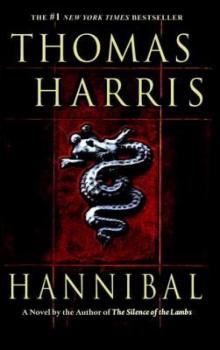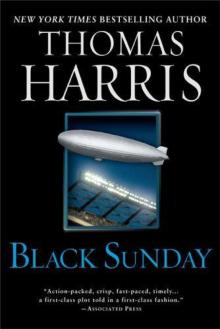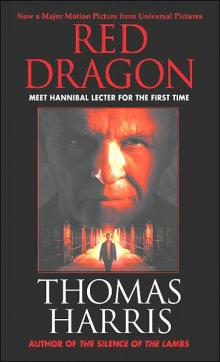- Home
- Thomas Harris
The Silence of the Lambs (Hannibal Lecter) Page 18
The Silence of the Lambs (Hannibal Lecter) Read online
Page 18
“Senator Martin.” Major Bachman was calling her. Chilton beckoned from the door.
There was a desk for Chilton in the room, and chairs for Senator Martin and her assistant and for Major Bachman. A video cameraman was ready to record the meeting. Chilton claimed it was one of Lecter’s requirements.
Senator Martin went in looking good. Her navy suit breathed power. She had put some starch in Gossage too.
Dr. Hannibal Lecter sat alone in the middle of the room in a stout oak armchair bolted to the floor. A blanket covered his straitjacket and leg restraints and concealed the fact that he was chained to the chair. But he still wore the hockey mask that kept him from biting.
Why? the Senator wondered—the idea had been to permit Dr. Lecter some dignity in an office setting. Senator Martin gave Chilton a look and turned to Gossage for papers.
Chilton went behind Dr. Lecter and, with a glance at the camera, undid the straps and removed the mask with a flourish.
“Senator Martin, meet Dr. Hannibal Lecter.”
Seeing what Dr. Chilton had done for showmanship frightened Senator Martin as much as anything that had happened since her daughter disappeared. Any confidence she might have had in Chilton’s judgment was replaced with the cold fear that he was a fool.
She’d have to wing it.
A lock of Dr. Lecter’s hair fell between his maroon eyes. He was as pale as the mask. Senator Martin and Hannibal Lecter considered each other, one extremely bright and the other not measurable by any means known to man.
Dr. Chilton returned to his desk, looked around at everyone, and began:
“Dr. Lecter has indicated to me, Senator, that he wants to contribute to the investigation some special knowledge, in return for considerations regarding the conditions of his confinement.”
Senator Martin held up a document. “Dr. Lecter, this is an affidavit which I’ll now sign. It says I’ll help you. Want to read it?”
She thought he wasn’t going to reply and turned to the desk to sign, when he said:
“I won’t waste your time and Catherine’s time bargaining for petty privileges. Career climbers have wasted enough already. Let me help you now, and I’ll trust you to help me when it’s over.”
“You can count on it. Brian?”
Gossage raised his pad.
“Buffalo Bill’s name is William Rubin. He goes by Billy Rubin. He was referred to me in April or May 1975, by my patient Benjamin Raspail. He said he lived in Philadelphia, I can’t remember an address, but he was staying with Raspail in Baltimore.”
“Where are your records?” Major Bachman broke in.
“My records were destroyed by court order shortly after—”
“What did he look like?” Major Bachman said.
“Do you mind, Major? Senator Martin, the only—”
“Give me an age and a physical description, anything else you can remember,” Major Bachman said.
Dr. Lecter simply went away. He thought about something else—Géricault’s anatomical studies for The Raft of the Medusa—and if he heard the questions that followed, he didn’t show it.
When Senator Martin regained his attention, they were alone in the room. She had Gossage’s pad.
Dr. Lecter’s eyes focused on her. “That flag smells like cigars,” he said. “Did you nurse Catherine?”
“Pardon me? Did I…”
“Did you breast-feed her?”
“Yes.”
“Thirsty work, isn’t it…?”
When her pupils darkened, Dr. Lecter took a single sip of her pain and found it exquisite. That was enough for today. He went on: “William Rubin is about six feet one, and would be thirty-five years old now. He’s strongly built—about one hundred ninety pounds when I knew him and he’s gained since then, I expect. He has brown hair and pale blue eyes. Give them that much, and then we’ll go on.”
“Yes, I’ll do that,” Senator Martin said. She passed her notes out the door.
“I only saw him once. He made another appointment, but he never came again.”
“Why do you think he’s Buffalo Bill?”
“He was murdering people then, and doing some similar things with them, anatomically. He said he wanted some help to stop, but actually he just wanted to schmooze about it. To rap.”
“And you didn’t—he was sure you wouldn’t turn him in?”
“He didn’t think I would, and he likes to take chances. I had honored the confidences of his friend Raspail.”
“Raspail knew he was doing this?”
“Raspail’s appetites ran to the louche—he was covered with scars.
“Billy Rubin told me he had a criminal record, but no details. I took a brief medical history. It was unexceptional, except for one thing: Rubin told me he once suffered from elephant ivory anthrax. That’s all I remember, Senator Martin, and I expect you’re anxious to go. If anything else occurs to me, I’ll send you word.”
“Did Billy Rubin kill the person whose head was in the car?”
“I believe so.”
“Do you know who that is?”
“No. Raspail called him Klaus.”
“Were the other things you told the FBI true?”
“At least as true as what the FBI told me, Senator Martin.”
“I’ve made some temporary arrangements for you here in Memphis. We’ll talk about your situation and you’ll go on to Brushy Mountain when this is … when we’ve got it settled.”
“Thank you. I’d like a telephone, if I think of something.…”
“You’ll have it.”
“And music. Glenn Gould, the Goldberg Variations? Would that be too much?”
“Fine.”
“Senator Martin, don’t entrust any lead solely to the FBI. Jack Crawford never plays fair with the other agencies. It’s such a game with those people. He’s determined to have the arrest himself. A ‘collar,’ they call it.”
“Thank you, Dr. Lecter.”
“Love your suit,” he said as she went out the door.
CHAPTER 33
Room into room, Jame Gumb’s basement rambles like the maze that thwarts us in dreams. When he was still shy, lives and lives ago, Mr. Gumb took his pleasure in the rooms most hidden, far from the stairs. There are rooms in the farthest corners, rooms from other lives, that Gumb hasn’t opened in years. Some of them are still occupied, so to speak, though the sounds from behind the doors peaked and trailed off to silence long ago.
The levels of the floors vary from room to room by as much as a foot. There are thresholds to step over, lintels to duck. Loads are impossible to roll and difficult to drag. To march something ahead of you—it stumbling and crying, begging, banging its dazed head—is difficult, dangerous even.
As he grew in wisdom and in confidence, Mr. Gumb no longer felt he had to meet his needs in the hidden parts of the basement. He now uses a suite of basement rooms around the stairs, large rooms with running water and electricity.
The basement is in total darkness now.
Beneath the sand-floored room, in the oubliette, Catherine Martin is quiet.
Mr. Gumb is here in the basement, but he is not in this chamber.
The room beyond the stairs is black to human vision, but it is full of small sounds. Water trickles here and small pumps hum. In little echoes the room sounds large. The air is moist and cool. Smell the greenery. A flutter of wings against the cheek, a few clicks across the air. A low nasal sound of pleasure, a human sound.
The room has none of the wavelengths of light the human eye can use, but Mr. Gumb is here and he can see very well, though he sees everything in shades and intensities of green. He’s wearing an excellent pair of infrared goggles (Israeli military surplus, less than four hundred dollars) and he directs the beam of an infrared flashlight on the wire cage in front of him. He is sitting on the edge of a straight chair, rapt, watching an insect climb a plant in the screen cage. The young imago has just emerged from a split chrysalis in the moist earth of the cage flo
or. She climbs carefully on a stalk of nightshade, seeking space to unfurl the damp new wings still wadded on her back. She selects a horizontal twig.
Mr. Gumb must tilt his head to see. Little by little the wings are pumped full of blood and air. They are still stuck together over the insect’s back.
Two hours pass. Mr. Gumb has hardly moved. He turns the infrared flashlight on and off to surprise himself with the progress the insect has made. To pass the time he plays the light over the rest of the room—over his big aquariums full of vegetable tanning solution. On forms and stretchers in the tanks, his recent acquisitions stand like broken classic statuary green beneath the sea. His light moves over the big galvanized worktable with its metal pillow block and backsplash and drains, touches the hoist above it. Against the wall, his long industrial sinks. All in the green images of filtered infrared. Flutters, streaks of phosphorescence cross his vision, little comet trails of moths free in the room.
He switches back to the cage just in time. The big insect’s wings are held above her back, hiding and distorting her markings. Now she brings down her wings to cloak her body and the famous design is clear. A human skull, wonderfully executed in the furlike scales, stares from the back of the moth. Under the shaded dome of the skull are the black eye holes and prominent cheekbones. Beneath them darkness lies like a gag across the face above the jaw. The skull rests on a marking flared like the top of a pelvis.
A skull stacked upon a pelvis, all drawn on the back of a moth by an accident of nature.
Mr. Gumb feels so good and light inside. He leans forward, puffs soft air across the moth. She raises her sharp proboscis and squeaks angrily.
He walks quietly with his light into the oubliette room. He opens his mouth to quiet his breathing. He doesn’t want to spoil his mood with a lot of noise from the pit. The lenses of his goggles on their small protruding barrels look like crab eyes on stalks. Mr. Gumb knows the goggles aren’t the least bit attractive, but he has had some great times with them in the black basement, playing basement games.
He leans over and shines his invisible light down the shaft.
The material is lying on her side, curled like a shrimp. She seems to be asleep. Her waste bucket stands beside her. She has not foolishly broken the string again, trying to pull herself up the sheer walls. In her sleep, she clutches the corner of the futon against her face and sucks her thumb.
Watching Catherine, playing the infrared flashlight up and down her, Mr. Gumb prepares himself for the very real problems ahead.
The human skin is fiendishly difficult to deal with if your standards are as high as Mr. Gumb’s. There are fundamental structural decisions to make, and the first one is where to put the zipper.
He moves the beam down Catherine’s back. Normally he would put the closure in the back, but then how could he don it alone? It won’t be the sort of thing he can ask someone to help him with, exciting as that prospect might be. He knows of places, circles, where his efforts would be much admired—there are certain yachts where he could preen—but that will have to wait. He must have things he can use alone. To split the center front would be sacrilege—he puts that right out of his mind.
Mr. Gumb can tell nothing of Catherine’s color by infrared, but she looks thinner. He believes she may have been dieting when he took her.
Experience has taught him to wait from four days to a week before harvesting the hide. Sudden weight loss makes the hide looser and easier to remove. In addition, starvation takes much of his subjects’ strength and makes them more manageable. More docile. A stuporous resignation comes over some of them. At the same time, it’s necessary to provide a few rations to prevent despair and destructive tantrums that might damage the skin.
It definitely has lost weight. This one is so special, so central to what he is doing, he can’t stand to wait long, and he doesn’t have to. Tomorrow afternoon, he can do it, or tomorrow night. The next day at the latest. Soon.
CHAPTER 34
Clarice Starling recognized the Stonehinge Villas sign from television news. The East Memphis housing complex, a mix of flats and town houses, formed a large U around a parking field.
Starling parked her rented Chevrolet Celebrity in the middle of the big lot. Well-paid blue-collar workers and bottom-echelon executives lived here—the Trans-Ams and IROC-Z Camaros told her that. Motor homes for the weekends and ski boats bright with glitter paint were parked in their own section of the lot.
Stonehinge Villas—the spelling grated on Starling every time she looked at it. Probably the apartments were full of white wicker and peach shag. Snapshots under the glass of the coffee table. The Dinner for Two Cookbook and Fondue on the Menu. Starling, whose only residence was a dormitory room at the FBI Academy, was a severe critic of these things.
She needed to know Catherine Baker Martin, and this seemed an odd place for a senator’s daughter to live. Starling had read the brief biographical material the FBI had gathered, and it showed Catherine Martin to be a bright underachiever. She’d failed at Farmington and had two unhappy years at Middlebury. Now she was a student at Southwestern and a practice teacher.
Starling could easily have pictured her as a self-absorbed, blunted, boarding-school kid, one of those people who never listen. Starling knew she had to be careful here because she had her own prejudices and resentments. Starling had done her time in boarding schools, living on scholarships, her grades much better than her clothes. She had seen a lot of kids from rich, troubled families, with too much boarding-school time. She didn’t give a damn about some of them, but she had grown to learn that inattention can be a stratagem to avoid pain, and that it is often misread as shallowness and indifference.
Better to think of Catherine as a child sailing with her father, as she was in the film they showed with Senator Martin’s plea on television. She wondered if Catherine tried to please her father when she was little. She wondered what Catherine was doing when they came and told her that her father was dead, of a heart attack at forty-two. Starling was positive Catherine missed him. Missing your father, the common wound, made Starling feel close to this young woman.
Starling found it essential to like Catherine Martin because it helped her to bear down.
Starling could see where Catherine’s apartment was located—two Tennessee Highway Patrol cruisers were parked in front of it. There were spots of white powder on the parking lot in the area closest to the apartment. The Tennessee Bureau of Investigation must have been lifting oil stains with pumice or some other inert powder. Crawford said the TBI was pretty good.
Starling walked over to the recreational vehicles and boats parked in the special section of the lot in front of the apartment. This is where Buffalo Bill got her. Close enough to her door so that she left it unlocked when she came out. Something tempted her out. It must have been a harmless-looking setup.
Starling knew the Memphis police had done exhaustive door-to-door interviews and nobody had seen anything, so maybe it happened among the tall motor homes. He must have watched from here. Sitting in some kind of vehicle, had to be. But Buffalo Bill knew Catherine was here. He must have spotted her somewhere and stalked her, waiting for his chance. Girls the size of Catherine aren’t common. He didn’t just sit around at random locations until a woman of the right size came by. He could sit for days and not see one.
All the victims were big. All of them were big. Some were fat, but all were big. “So he can get something that will fit.” Remembering Dr. Lecter’s words, Starling shuddered. Dr. Lecter, the new Memphian.
Starling took a deep breath, puffed up her cheeks and let the air out slowly. Let’s see what we can tell about Catherine.
A Tennessee state trooper wearing his Smokey the Bear hat answered the door of Catherine Martin’s apartment. When Starling showed him her credentials, he motioned her inside.
“Officer, I need to look over the premises here.” Premises seemed a good word to use to a man who had his hat on in the house.
He nod
ded. “If the phone rings, leave it alone. I’ll answer it.”
On the counter in the open kitchen Starling could see a tape recorder attached to the telephone. Beside it were two new telephones. One had no dial—a direct line to Southern Bell security, the mid-South tracing facility.
“Can I help you any way?” the young officer asked.
“Are the police through in here?”
“The apartment’s been released to the family. I’m just here for the telephone. You can touch stuff, if that’s what you want to know.”
“Good, I’ll look around then.”
“Okay.” The young policeman retrieved the newspaper he had stuffed beneath the couch and resumed his seat.
Starling wanted to concentrate. She wished she were alone in the apartment, but she knew she was lucky the place wasn’t full of cops.
She started in the kitchen. It was not equipped by a serious cook. Catherine had come for popcorn, the boyfriend had told police. Starling opened the freezer. There were two boxes of microwave popcorn. You couldn’t see the parking lot from the kitchen.
“Where you from?”
Starling didn’t register the question the first time.
“Where you from?”
The trooper on the couch was watching her over his newspaper.
“Washington,” she said.
Under the sink—yep, scratches on the pipe joint, they’d taken the trap out and examined it. Good for the TBI. The knives were not sharp. The dishwasher had been run, but not emptied. The refrigerator was devoted to cottage cheese and deli fruit salad. Catherine Martin shopped for fast-food groceries, probably had a regular place, a drive-in she used close by. Maybe somebody cruised the store. That’s worth checking.

 The Silence of the Lambs
The Silence of the Lambs Red Dragon
Red Dragon Hannibal
Hannibal Black Sunday
Black Sunday Cari Mora
Cari Mora Hannibal Rising
Hannibal Rising Red Dragon hl-1
Red Dragon hl-1 The Silence of the Lambs (Hannibal Lecter)
The Silence of the Lambs (Hannibal Lecter)